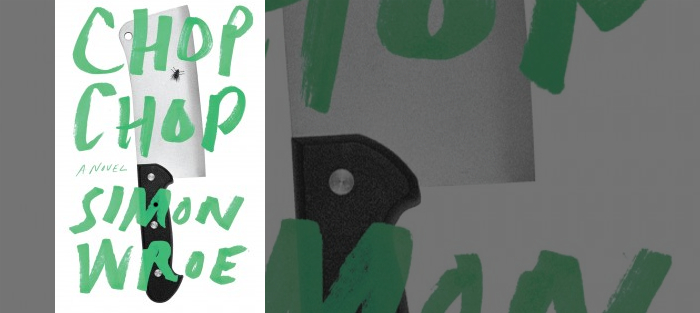In Chop, Chop (The Penguin Press, 2014), a foodie’s nightmare and a biting parody of a restaurant kitchen commanded by a sadist, Simon Wroe exposes the underbelly of a kitchen beast. The secrets George Orwell revealed in Down and Out in London and Paris (remember, the more food is handled in preparation the more it costs) pale in comparison to the practices in the Camdentown kitchen of The Swan. The author, a former chef, certainly has (forgive me) the chops to tell this story. Wroe knows his way around the batterie de cuisine as well as the literary canon, and shows off both bodies of knowledge here.
The first person narrator, an aspiring novelist freshly graduated from university with an English literature degree, reluctantly abandons his armchair reading out of financial desperation. He signs on as comis—lower than sous chef, a step above dishwasher. Kitchen co-workers nickname him Monocle in mocking reference to his education. Struggling on his first day to chop onions with his unscarred, lily-white hands he realizes,
“I knew nothing about food or cooking. Also, more worryingly, nothing about people or communication. Months of fiction in that armchair, and years of studying it before that, had left me dealing with life at reading speed. Conversations passed me by while I was still formulating a response. People here dealt with one another so firmly, with no concerns for the nuances of situation. Violent, ugly scenes were followed by swift resolves. A passage of action Dostoevesky might have covered in thirty pages was done and dusted in thirty seconds.”
Work at The Swan provides the innocent narrator with both life experience and material for the book we are reading, Monocle’s first novel. The down-trodden kitchen staff become comrades and also beta-readers for his work in progress. Monocle shares their comments and critiques with us, pulling back the curtain on the process of creating the novel as well as the events in the kitchen. When Monocle’s estranged father arrives to squat in his son’s flat, two blood-drenched plot lines—the current kitchen drama and a past family tragedy—blend. Monocle sprinkles the pages with flashbacks to his brother’s death and heavy foreshadowing of the climactic kitchen mutiny.
Both plot and prose are vigorous but Monocle’s passive angst in the face of the overt cruelty of head chef Bob (as a relatively mild punishment he locks unsatisfactory employees in the walk in fridge) as well as his father’s covert exploitation and nastiness when he shows up uninvited and squats in Monocle’s flat risks reader impatience. The victim stance may represent Wroe’s deliberate authorial intent to convey a sort of youthful narcissism and sense of helplessness. However this reader must agree with a manuscript critique Monocle himself receives and reports. His kitchen ally and trusted reader Racist Dave
“…says I should stop feeling so sorry for myself. He advises me to jog on with the story and asks if we are going to the gash and drugs and trouble soon. I have reminded him what Walter Benjamin said about storytelling, that ‘boredom is the dream bird that hatches the egg of experience.’ This argument has failed to impress him.”
Monocle does, finally, cut to the chase and the novel achieves both the oft-promised dramatic revolution in the kitchen and a tentative resolution of the family stand-off. The young narrator takes part in the action, and with hands scarred with the burns and cuts of culinary experience, he finally finds the courage to reach out to the only woman in the kitchen: “quiet dark-eyed Harmony.” She has hovered in the background and above the fray through all the pages, watching him, wise as Homer’s grey-eyed Athena. At last, girl may be getting boy.

Readers with a taste for kitchen confidential tales served up raw will enjoy this novel with its side order of domestic drama and literary allusions ranging from Mary Poppins to Macbeth. This is emphatically not, however, for those who seek delicious culinary fiction accompanied by recipes like Laura Esquivel’s Como Agua para Chocolate. Rather, we must be grateful there are no recipes included for the unforgettable special banquet fare grotesque Chef Bob creates for The Swan’s sinister, mysterious patron The Fat Man.
Compliments to Chef Wroe, but dear reader, beware. Bring your iron-clad stomach and prepare for a meal bloody as steak tartare. This smart, snide take down of culinary and literary pretension may be hazardous to your appetite for dining out. Consume at your own risk.






